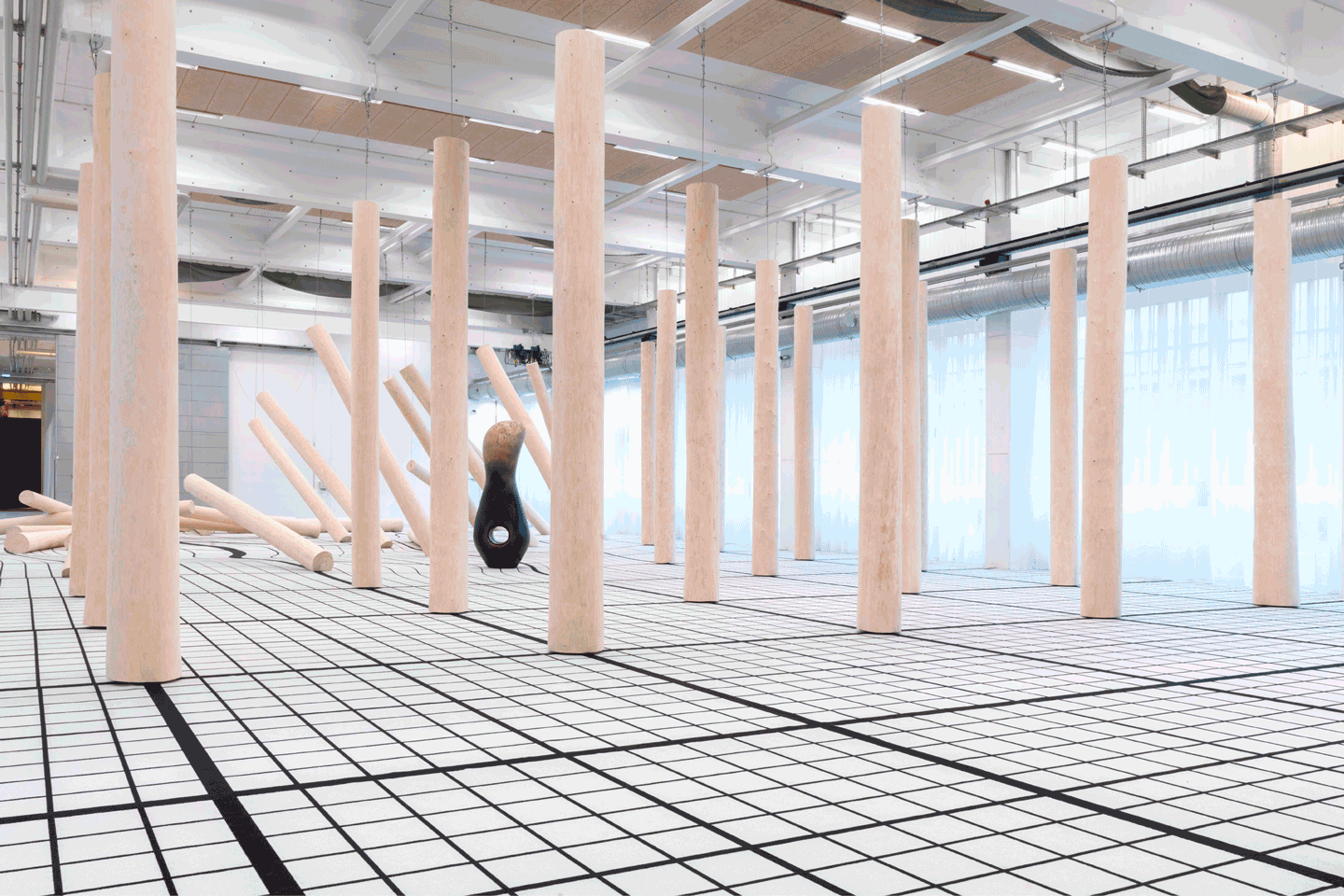I Have Grown Taller from Standing with Trees
February 8–September 1, 2019
SEIZURE
February 8–May 26, 2019
Refshalevej 173A
1432 Copenhagen
Denmark
Hours: Wednesday–Sunday 11am–6pm,
Thursday 11am–9pm
T +45 29 89 72 88
contact@cphco.org
Copenhagen Contemporary presents two of contemporary art’s great talents. In Hall 1, Claudia Comte (b. 1983) shows her largest solo exhibition to date: a total installation covering 1100 m2 entitled I Have Grown Taller from Standing with Trees. In Hall 3, Marianna Simnett (b. 1986) presents SEIZURE featuring the large-scale installation Faint with Light and video work The Needle and the Larynx.
Claudia Comte
I Have Grown Taller from Standing with Trees
For Copenhagen Contemporary’s largest hall, Claudia Comte has created the immersive installation I Have Grown Taller from Standing with Trees. Rows of six-metre-tall debarked trees are positioned along a black and white graphic grid on a digitally printed carpet. A large ceramic sculpture sits at the centre of this seemingly peaceful forest enveloped by filtered light, sound, and the mild scent of resin released by the spruces.
Moving through the exhibition, however, a collapse of order becomes apparent. The trunks have been struck by a powerful force and are suspended in an entropic state. The geometrical grid of the carpet evokes the root system of the trees, which, via underground fungi networks, communicate with other trees along the forest floor. The grid—a structure relaying order and clarity—is also distorted, visualising the effects of this large-scale disturbance upon the forest ecosystem.
Known for her large-scale installations that bring together organic forms, digital technologies, and handmade sculptures, Comte’s work highlights the history of materiality and industrial production. As such, the spruce trees may be viewed as time capsules where varying climate conditions are reflected in the way the trunks’ annual rings grow at different rates. This is worth bearing in mind when walking among the spruces, all approximately one hundred years old.
Visitors are invited to walk amongst the trees, climb the fallen trunks, and to engrave their names or statements into the trunks. The artist also invites the audience to participate in a series of performances scheduled for the exhibition period.
Marianna Simnett
SEIZURE
SEIZURE is the first solo exhibition in Scandinavia by Marianna Simnett and presents her mesmerizing installation Faint with Light and video parable The Needle and the Larynx, in which normative bodies and genders undergo radical transformations. The artist’s own body, mutated and remodeled, becomes a site for playing out her hypnotic fantasies.
A seizure, according to the writer and mythographer Marina Warner, describes the effect of the passions on the body. Inner forces such as madness and folly, personified in tragedies of the Greek poet Homer as feminine, snatch and grab the interior of the human creature and take possession.
Faint with Light (2016) records Simnett inducing a cycle of fainting attacks through hyperventilation. The sound of her breath is monitored by ultra-bright lights that rise and fall on a 12-metre wall dividing the space. Simnett’s blackouts provide an alarming soundtrack, alerting us to our most vital bodily function. Intense flashes of light dance to choked gasps for air: a reminder of the fragile border separating consciousness from unconsciousness, life from death.
Simnett writes herself into a lineage of performance artists who subject themselves to extreme actions in order to challenge the limits of the body. However, in contrast to the work of artists such as Carolee Schneemann, VALIE EXPORT and Chris Burden, Simnett’s physical body is hauntingly absent. We do not see her pass out—instead we witness a never-ending loop of her collapse and revival.
In The Needle and the Larynx (2016), a voice surgeon injects Botox into her larynx, which effectively causes her voice to deepen for several months. Footage of the treatment is accompanied by a fable about a girl who asks to have her voice lowered and threatens the reluctant doctor with a plague of mosquitoes, should he refuse. The Needle and the Larynx caricatures gender stereotypes and undermines the demands of a repressive society on women’s bodies. Capturing her own experience as a patient, she questions the history and orthodoxies of the medical profession.

